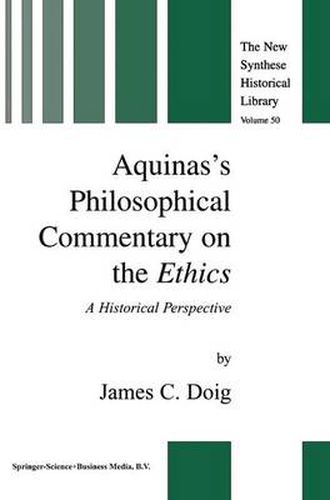Readings Newsletter
Become a Readings Member to make your shopping experience even easier.
Sign in or sign up for free!
You’re not far away from qualifying for FREE standard shipping within Australia
You’ve qualified for FREE standard shipping within Australia
The cart is loading…






This title is printed to order. This book may have been self-published. If so, we cannot guarantee the quality of the content. In the main most books will have gone through the editing process however some may not. We therefore suggest that you be aware of this before ordering this book. If in doubt check either the author or publisher’s details as we are unable to accept any returns unless they are faulty. Please contact us if you have any questions.
Is Aquinas’s Sententia libri Ethicorum an interpretation of Aristotle based on principles of Christian ethics ? Or do we see in the work a presentation of the foundation of Aquinas’s moral philosophy? The author answers these questions by examining the historical context within which the Sententia was composed. Chapters 1 and 2 establish the work’s role as a corrective to earlier commentaries. Chapter 3 examines philosophy at Paris between 1215 and 1283 and so reveals that Aquinas’s proposal of a moral philosophy would have been unexceptional. Chapter 4’s investigation of the principles underlying the moral theory of the Sententia makes it apparent that Aquinas regarded them as both philosophical and Aristotelian. The date to be assigned to the composition of the Sententia is studied in Chapter 5, with the conclusion that the work is quite probably the author’s final proposal of moral doctrines. The closing chapter summarizes that moral philosophy against the historical background earlier adduced.
$9.00 standard shipping within Australia
FREE standard shipping within Australia for orders over $100.00
Express & International shipping calculated at checkout
This title is printed to order. This book may have been self-published. If so, we cannot guarantee the quality of the content. In the main most books will have gone through the editing process however some may not. We therefore suggest that you be aware of this before ordering this book. If in doubt check either the author or publisher’s details as we are unable to accept any returns unless they are faulty. Please contact us if you have any questions.
Is Aquinas’s Sententia libri Ethicorum an interpretation of Aristotle based on principles of Christian ethics ? Or do we see in the work a presentation of the foundation of Aquinas’s moral philosophy? The author answers these questions by examining the historical context within which the Sententia was composed. Chapters 1 and 2 establish the work’s role as a corrective to earlier commentaries. Chapter 3 examines philosophy at Paris between 1215 and 1283 and so reveals that Aquinas’s proposal of a moral philosophy would have been unexceptional. Chapter 4’s investigation of the principles underlying the moral theory of the Sententia makes it apparent that Aquinas regarded them as both philosophical and Aristotelian. The date to be assigned to the composition of the Sententia is studied in Chapter 5, with the conclusion that the work is quite probably the author’s final proposal of moral doctrines. The closing chapter summarizes that moral philosophy against the historical background earlier adduced.